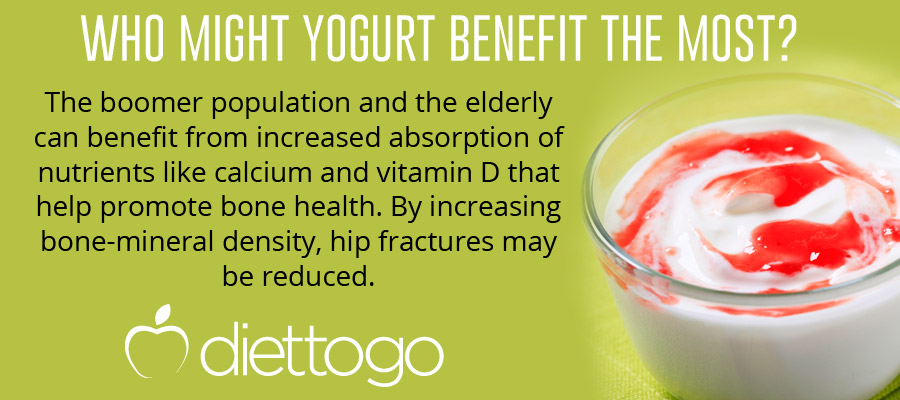5 Things You Never Knew Yogurt Could Do for You
Feb 23, 2015

Lately, yogurt has enjoyed a super-swift lift to the top of “health food” lists everywhere. We can credit some of that enthusiasm to the very smart marketing of top yogurt brands looking to reignite consumer interest in an age-old product. But there is truth behind the buzz and scientific research that does in fact prove that yogurt deserves its time in the lime light.
Here are five things you may not know about yogurt and your health:

#1 - Lower Blood Pressure
Probiotics or “good bacteria” found in yogurt and other dairy products like cheese, may help to reduce blood pressure when consumed regularly over two months. The research is published in the American Heart Association journal, Hypertension. Scientists advise looking for yogurts containing probiotics, or seeking out other products with probiotics such as kefir, buttermilk, and Korean kimchi.
#2 - Better Absorption of Nutrients
Yogurt has a higher concentration of calcium, protein and other vitamins and minerals than milk – as much as 20 to 100 percent more – making it a powerhouse of nutrients to start. As an added bonus, the acidic pH of yogurt makes it easier for the body to absorb calcium, magnesium and zinc.
Researchers at Tufts University note that if Americans would eat more yogurt, it would go a long way towards filling nutrient gaps in our diets. Case in point, the U.S. Dietary Guidelines Advisory Committee, who will be announcing the latest Nutrition Guidelines for Americans later this year, pull out calcium, vitamin D and potassium as nutrients of concern for the general population. Assuming the yogurt is made with vitamin D-fortified milk, these nutrients of concern are all plentiful in yogurt.
#3 - Lower Levels of Circulating Triglycerides
Preliminary research shows that yogurt consumption may also help your heart by lowering levels of circulating triglycerides. A recent Australian study found that eating full-fat cultured yogurt and cheese for three weeks can lower inflammatory markers linked to heart disease, compared with eating low-fat, non-cultured dairy. Another report in the American Journal of Clinical Nutrition shows that calcium and other bioactive components may modify the effects on LDL (low-density lipoprotein or “bad”) cholesterol and triglycerides which in turn may reduce the risk of cardiovascular disease.
#4 - Lower Blood Glucose
Researchers in the United Kingdom looked at the diets of 4,000 people and followed them for 11 years. They found that people with the highest yogurt consumption had a 24 percent lower risk of developing diabetes, compared with people who didn't eat yogurt.
#5 - Better Weight Management
Data published in the International Journal of Obesity (2014) showed that people who ate more than three servings of yogurt a week gained less weight over the course of a year than those who ate less than one serving. A meta-analysis (which combines the results from multiple studies to increase power) had similar findings – yogurt-rich diets were associated with less weight gain over time. What’s interesting is that this same association was not seen with milk, leading researchers to believe that the benefit does not come from calcium but, instead, from the fermentation, products of fermentation or from the live cultures themselves.

Not All Yogurt Is Created Equal
While there is a strong correlation between yogurt and a plethora of health benefits, nutritionists warn that you should be choosy when selecting your yogurt. This may be easier said than done – between 2010 and 2011 alone, more than 600 new yogurt products were introduced. Furthermore, this over 7 billion dollar industry is still growing.
According to the nutrition experts at sparkpeople.com, a 6-ounce serving of yogurt should contain:
- Less than 180 calories. For those following a lower calorie diet for weight loss, 120 calories is preferred.
- Less than 4 grams of fat. A yogurt made with whole milk will contain 7-9 grams of fat; a low-fat yogurt contains 2-4 grams, and a non-fat variety has 0 grams fat.
- Less than 30 grams of sugar. Keep in mind that the milk used to make yogurt naturally contains about 12 grams of milk sugar per 6-ounce serving, and many manufacturers add more sugar, either artificial or natural. You will have to read the ingredients list to find out which type(s) of added sweetener your yogurt contains.
- At least 5 grams of protein.
- At least 20% of your daily value (DV) of calcium.
- At least 10% of your daily value (DV) of vitamin D. Some yogurts are fortified with vitamin D, which enhances calcium absorption and promotes bone health.
Yogurt: How to Get More of ItSo, next time you’re looking for a delicious, nutrient-rich snack, try this recipe from Prevention. It’s not only bursting with flavor, it won’t break the calorie bank, with just 110 calories per pop!

.jpg) Author: Kristen Ciuba
Author: Kristen Ciuba
Kristen is a Nutritionist at Diet-to-Go, based in Lorton, VA. She tries to “practice what she preaches” by fitting in healthy foods and cooking, challenging exercise, and quality time with family and friends every day!









